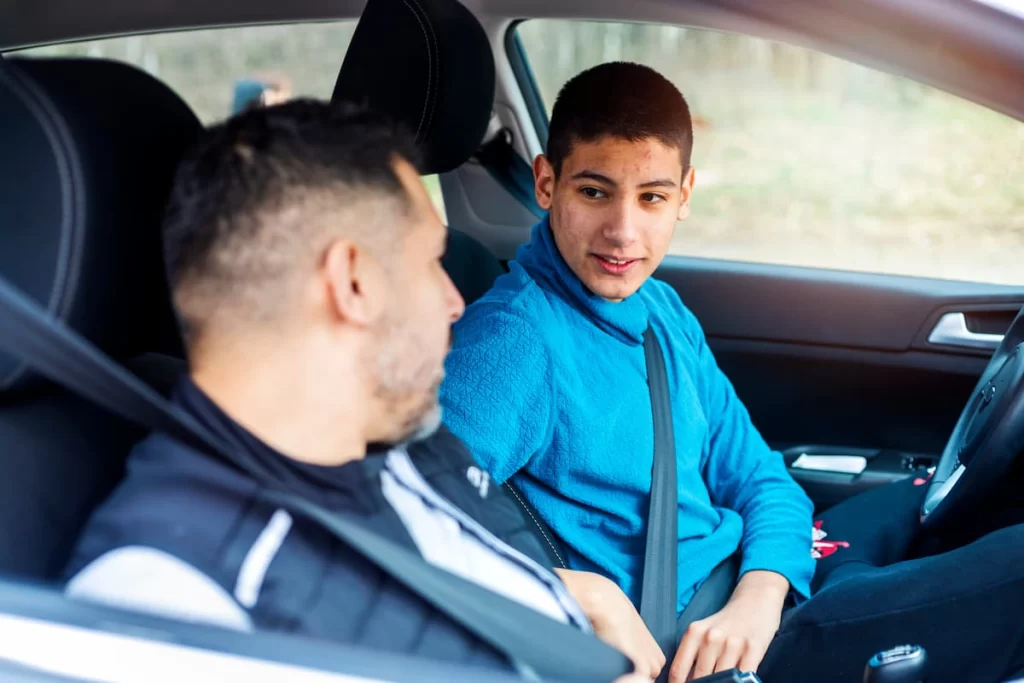If you or your teen have been injured in an accident with a drunk driver, our St. Louis car accident lawyer can help you pursue the compensation you deserve.

It can be challenging to get teenagers to pay attention and take your advice seriously. At the same time, it’s crucial that parents talk to their teens about drunk driving.
Not only are alcohol-related accidents one of the leading causes of death for young people, but engaging in this risky behavior can also have long-term consequences that affect teens well into adulthood. Here are some tips you can use to guide your teen in the right direction.
Start Early
When talking to teens about drunk driving, it’s important to start early (well before they learn how to drive). This will help them develop positive attitudes toward responsible drinking and minimize the potential risks associated with driving under the influence.
There are several important things that parents can do right from the beginning:
- The first is setting clear guidelines regarding alcohol consumption, such as explaining that underage drinking or getting behind the wheel while drunk will not be tolerated.
- It’s also important to set expectations for responsible drinking – for example, your teens should never pressure others into drinking or driving if they have been drinking themselves.
- Additionally, it’s essential to discuss any concerns you may have about your teen’s safety when interacting with others who may consume alcohol in these settings.
Establish Open Communication
Next, it’s crucial that you maintain a collaborative relationship with your teen. Rather than lecturing or trying to come across as authoritarian, try having conversations where they feel like they have a say. Let them know that you’re available to talk any time they have questions or concerns about the issue. By taking this approach, you may just find that your teen is more receptive than you thought!
Support Your Message With Facts
Most teens have a tendency to discount anything that sounds far-fetched or like an arbitrary opinion. As such, simply stating your opinion about drunk driving is not enough. If you want your teen to take you seriously, you need to back up your arguments with facts and real-world examples.
According to recent reports, more than one in ten high school students reported that they drank and drove at least once during their time in high school. Additionally, research shows that teens are 17 times more likely to die in an auto crash when they have a BAC of 0.08% or higher. And those sobering numbers don’t even take into account reports that estimate that every 15 minutes, a teen dies from drunk driving.
Invest in Educational Materials
Alongside using statistics and facts, other effective tools for tackling underage drinking and drunk driving include offering educational resources like books and films. These materials can offer valuable information about the risks of drinking while also helping teens understand that you take their safety seriously.
Above all else, keep talking with your teen about this important issue over time so that they continue thinking critically about driving while under the influence well into adulthood. Remember that as a parent, you play a key role in helping keep your kids safe from harm as they grow up—so start those conversations today!
St. Louis Drunk Driving Lawyer
Unfortunately, despite our best efforts as parents, teen accidents can still happen. If you or your teen have been injured in an accident with a drunk driver, a St. Louis car accident lawyer at The Hoffman Law Firm can help you file a car injury claim and get the compensation you deserve. We have 25 years of experience and a proven track record of success. Contact us today to schedule a free consultation.
Why Choose Us vs TV Lawyers?
Direct Attorney Access
Maximum Settlement Focus
Trial-Ready Cases
Paralegal Handling
Quick Settlement Push
Settlement-Only Focus
Free Consultation with a St. Louis Car Accident Lawyer
Don’t talk to an insurance claims adjuster before speaking with The Hoffmann Law Firm, L.L.C. We can help you avoid making statements that may affect the outcome of your case. The consultation is free; you don’t pay unless we get you money!
